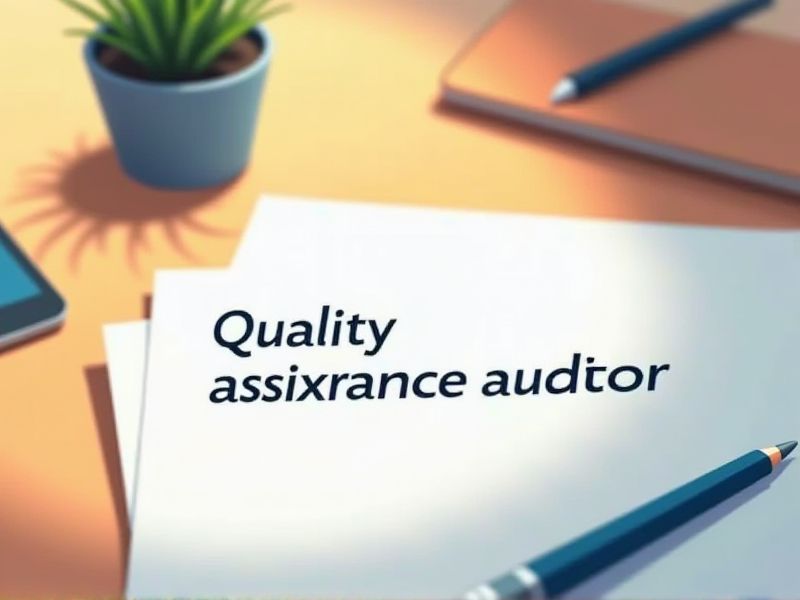
Quality assurance auditors play a crucial role in ensuring products and services meet established standards and comply with regulations. Certifications enhance their credibility and demonstrate proficiency in industry-specific quality standards. Acquiring these credentials also provides auditors with the necessary tools and methodologies to perform thorough assessments. Here are some important certifications needed for a Quality Assurance Auditor.
Certified Quality Auditor (CQA)
A Certified Quality Auditor (CQA) enhances credibility in quality assurance practices by demonstrating a comprehensive understanding of auditing principles. Having a CQA assures organizations that their quality systems are evaluated by professionals equipped with industry-standard knowledge. CQAs utilize their skills to identify inefficiencies, leading to optimized processes and cost savings. The certification signifies commitment to continuous improvement, aligning with organizations' goals for high-quality output.
ISO 9001 Lead Auditor
An ISO 9001 Lead Auditor is essential because they possess the expertise to evaluate an organization's compliance with international quality standards. Their knowledge directly affects the identification of process inefficiencies, helping to streamline operations. With their certification, they provide an authoritative assessment that increases stakeholder confidence in the quality management system. Having a certified Lead Auditor ensures that internal audits are in alignment with global best practices, supporting continuous improvement.
Certified Manager of Quality/Organizational Excellence (CMQ/OE)
The Certified Manager of Quality/Organizational Excellence (CMQ/OE) credential equips quality assurance auditors with advanced skills in leadership and strategic planning, which enhances their capability to drive organizational improvements. This certification ensures auditors possess a deep understanding of quality principles and tools, strengthening their ability to implement effective quality management systems. By holding this certification, auditors gain credibility and recognition in their field, which can open doors to career advancement and leadership opportunities. The CMQ/OE certification also reinforces a commitment to continuous improvement, a critical aspect of maintaining competitiveness in today's dynamic market environment.
Certified Quality Improvement Associate (CQIA)
A Certified Quality Improvement Associate (CQIA) enhances a quality assurance auditor's ability to apply fundamental quality principles, which is crucial in identifying and solving quality issues effectively. With this certification, an auditor gains a thorough understanding of quality improvement techniques and tools, thereby improving processes and outcomes. The CQIA credential demonstrates an assurance auditor's commitment to continuous professional development, enhancing credibility with stakeholders. Equipped with these skills, auditors are better positioned to contribute to the organization's overall performance by driving process efficiencies and ensuring compliance with quality standards.
Certified Quality Engineer (CQE)
A Certified Quality Engineer (CQE) contributes to the effectiveness of quality assurance by applying their extensive knowledge of quality control principles and statistical tools, directly enhancing product reliability. Their expertise in identifying and solving quality-related issues reduces defect rates, leading to improved customer satisfaction and cost savings. With a CQE's skill in designing and implementing quality management systems, organizations strengthen compliance with regulatory standards, minimizing the risk of legal complications. In competitive markets, a CQE provides companies with a strategic advantage by fostering continuous improvement and innovation in quality processes.
Lean Six Sigma Green Belt
Lean Six Sigma Green Belt certification helps a Quality Assurance auditor develop strong problem-solving skills, which are crucial for identifying and resolving defects in processes. Understanding Lean Six Sigma principles allows auditors to implement data-driven approaches, thereby enhancing process efficiency and reducing variation. Mastery of waste-reduction techniques aids auditors in streamlining operations, improving overall quality management. Green Belt training equips auditors with communication skills necessary for fostering a culture of continuous improvement within organizations.
Lean Six Sigma Black Belt
Becoming a Lean Six Sigma Black Belt equips a quality assurance auditor with advanced problem-solving skills, enabling more effective identification and elimination of process inefficiencies. Mastery in data-driven decision-making allows auditors to enhance organizational performance by addressing root causes rather than just symptoms. Proficiency in Lean Six Sigma facilitates improved collaboration across cross-functional teams, ensuring sustained and consistent quality improvements. Integrating these methodologies empowers auditors to drive continuous improvement initiatives, leading to superior quality products and services.
Certified Software Quality Analyst (CSQA)
The Certified Software Quality Analyst (CSQA) certification signals credibility and expertise in software quality processes. Individuals with a CSQA certification possess an in-depth understanding of quality principles, aiding auditors in identifying process improvements. Organizations benefit from auditors with CSQA certifications because they promote consistent adherence to industry standards. Improved problem-solving skills acquired through CSQA training enhance an auditor's ability to effectively diagnose and mitigate software issues.
ITIL Foundation Certification
The ITIL Foundation Certification equips quality assurance auditors with a standardized framework, enhancing their ability to assess IT service management practices effectively. This certification provides auditors with a comprehensive understanding of IT service lifecycles, enabling them to identify inefficiencies and improvement opportunities. It enhances an auditor's credibility and competence, aligning their evaluation processes with globally recognized ITIL best practices. With ITIL knowledge, auditors can more accurately assess alignment with business objectives, leading to improved service quality and customer satisfaction.
Six Sigma Master Black Belt
A Six Sigma Master Black Belt provides advanced expertise in statistical analysis and process improvement, essential for identifying and resolving complex quality assurance issues. Their leadership skills in Six Sigma methodologies enable them to mentor and train other team members, fostering a culture of continuous improvement. They bridge gaps between different departments, aligning quality assurance goals with organizational objectives for enhanced operational efficiency. Their ability to implement data-driven decision-making processes ensures higher accuracy in audits and more reliable outcomes.
Summary
By acquiring certifications, you can enhance your credibility and gain recognition in your field as a quality assurance auditor. This increased credibility often leads to improved career opportunities and potential salary boosts. Certifications can deepen your expertise, allowing you to effectively identify and address quality issues. As you apply refined skills, you contribute to higher product standards and organizational success.
